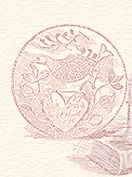Ihr liewe Leit:
Heidichdaags sehnt mer zimmlich oft Reife freih marrigeds. Un
heidichdaags sehnt mer iwwerall Karrebse. Un sell gemaahnt mich draa ass der
Samuel grob mol en Iwwersetzing gemacht hot vum James W. Riley seim Gedicht.
Do iss es:
Wann der Froscht iss uff de Karrebse un des Welschkannlaab iss gschackt,
Un mer heert der alt Welschhaahne wie er rumschtolsiert un gwackt,
Un’s Gewacker vun de Ginnies un des Schnadre vun de Gens—
Un der Haahne greeht sei “Guck-mol-do” un dribbelt uff der Fens;
O, mer fiehlt dann graad am beschde noch re ruhevolle Nacht,
Wann die Marrigesunn eem griesst un hallich in de Aage lacht,
Blottkopps geht mer noch der Scheier, fiedert Fieh aus Fass un Sack,
Wann der Froscht iss uff de Karrebse un des Welschkannlaab in Schack.
Es iss ebbes Aart vun hatzhaft alldo ringsum in der Luft
Wann des Summers Hitz verbei iss un der kiehle Harrebscht voll Duft,
Mer vermisst woll all die Blumme un die Bliede vun de Beem,
(Wu die schnurrend gleene Veggel un die Ieme warn deheem).
Doch die Luft iss abbeddittlich, un die Landschft vor dem Aag
Amme sunnich frische Marrige vumme friehe Schpotyaahrsdaag,
Iss en Bild ass schpott des Kinschtlers allerfeinschter Farrewegschmack—
Wann der Froscht iss uff de Karrebse un des Welschkannlaab in Schack.
Der rabblich, roh Gefladder wu aus Welschkannfaahne lacht,
Des rischble vum verwerrde Laab in goldner Marrigepracht;
Die Schtobble in der Farrich – sin woll en Aart verlossnes Bild,
Doch saage sie vun reicher Aernt un Scheier aagefillt;
Die Meehmaschien in Waageschopp, der Schtrohschtock in er Benn;
Die Geil in ihre Schtell, un’s Hoi in Baahr un Owwedenn!
Mei Haz fangt aa zu globe, O, ‘s geht wie die uhr, “Tick, tack,”
Wann der Froscht iss uff de Karregbse un des
Welschkannlaab in Schack.
Macht’s gut,
Der Alt Professer
|
Dear people:
These days you see quite often frost early in the mornings. And these
days one sees everywhere pumpkins. Here is a translation of James W.
Riley’s poem by Samuel Grob. The English is a literal translation of the
PG.
When the frost is on the pumpkins and the corn fodder is shocked,
And one hears the old turkey as he struts about and quacks,
And the quacking of the guineys and the chattering of the geese –
And the cock crows his “Look at me” and tiptoes on the fence;
Oh, one just feels the best after a restful night.
When the morning sun greets you and laughs gloriously into your eyes,
Bareheaded one goes to the barn, feeds the animals out of barrel and sack,
When the frost is on the pumpkin and the corn fodder is shocked.
There is something kind of
hearty-lie all around in the air
When the summer’s heat is over and the cool fall is full of aroma,
One surely misses all the flowers and the blossoms of the trees,
(Where the humming little birds and bees were at home).
But the air is appetizing, and the landscape before one’s eyes
On a sunny fresh morning of an early fall day,
Is a picture that mocks the artist’s finest taste for color –
When the frost is on the pumpkin and the corn fodder is shocked.
The rattling, raw flutter that laughs out of the corn silk,
The rustling of the tangled foliage in the morning’s splendor;
The stubble in the furrows – are no doubt a kind of an abandoned picture,
Yet they speak of a rich harvest and a barn completely filled;
The mower in the wagon shed, the straw shocks in the pen;
The horses in their stalls, and the hay in the mow and in the loft!
My heart begins to pound, Oh, it goes like a clock, “Tick, tock,”
When the frost is on the pumpkin and the corn fodder is shocked.
Take care,
The Old Professor
|













